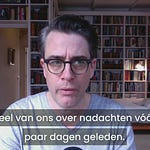I made the above video to support the publication of a book, Gaza no coração: história, resistência e solidariedade na Palestina, to which I contributed in Brazil. More on that in a second.
When I made this, I thought it might be nice to add subtitles: I see people doing that more and more, so I found a service online that does that, and I generated subtitles in Portuguese. The service was incredible. It made a couple of tiny, tiny errors — really tiny — but it was 99% accurate, and it generated the subtitles in a few seconds.
Then I thought I would send it around to the English-speaking folks here, and I looked and saw I could translate it into English. And sure enough: in a few seconds, there were the subtitles. The translation, too, was 99% accurate.
It is incredible. Only a few months ago, when I was in South Africa, I had to pay people hundreds of dollars to do this kind of transcription work for me. It took a couple of weeks. I am very sorry for these people, whose jobs seem to have suddenly become superfluous, but I am also a working writer who does not have limitless income or time. In my work as an interviewer, this has cost me untold amounts of money, and the results of human transcribers are often not as good as this. It feels like a revolution.
Anyway: in the video I recommend three books, besides the anthology in which I participated with so many brilliant Brazilian activists. That book is not available in English, but the other three are. Please read them if you haven’t yet:
Antony Lowenstein’s The Palestine Laboratory: How Israel Exports the Technology of Occupation Around the World
Andreas Malm’s The Destruction of Palestine is the Destruction of the Earth
Atef Abu Saif’s Don't Look Left: A Diary of Genocide.
As I say in the video, we all have an obligation to educate ourselves about Palestine. I don’t think it’s melodramatic or overstated to say that we are currently engaged in a battle for the soul of the world. Do we want to live in the horrific world that this last year has shown us all is possible, or do we want to commit ourselves to something better?







